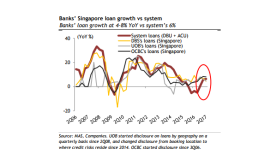Singapore
The future of risk in financial services
The regulatory and business environments have become more volatile and unpredictable. Financial institutions have also faced a tsunami of new regulatory requirements which have driven up compliance costs, whilst increased capital and liquidity requirements have reduced returns. At the same time, fintech startups are threatening to disrupt traditional financial services business models.
The future of risk in financial services
The regulatory and business environments have become more volatile and unpredictable. Financial institutions have also faced a tsunami of new regulatory requirements which have driven up compliance costs, whilst increased capital and liquidity requirements have reduced returns. At the same time, fintech startups are threatening to disrupt traditional financial services business models.
The risk and compliance function of the future
Asian banks have seen an exponential growth in regulatory requirements in recent years, including a greater focus on consumer protection, market integrity and a demand for faster remediation of supervisory issues. This has added to the cost of operationalising compliance across the three lines of defence. For instance, firms are investing heavily on the business side to develop consistent methodologies, enhance data lineage, and implement risk identification. The industry’s approach to compliance though has been tactical and has amplified the need for end-to-end tools and platforms capable of automating and integrating front-to-back operations with compliance requirements that will ultimately drive accountability into the first line. As firms continue to make technological advancements that enhance customer experience and increase convenience, the next challenge for Asian banks is to look for practical and more effective ways to take advantage of “big data” — customer, risk, financial, operational, and more — that holds the potential to address many of these compliance concerns. However, managing this data efficiently, manipulating it effectively to serve a variety of purposes, ensuring sufficient quality to yield actionable results, and safeguarding it from cyberattacks remain elusive. Human biases and other limitations in managing big data’s multiple sources, volume, and complexity, whilst unavoidable, have only served to exacerbate these concerns. Although significant cost and effort has been expended, many firms still find themselves in non-compliance with regulatory obligations which has led to substantial fines and considerable reputational damage. From big data to smart data To address these challenges, Asian banks are exploring RegTech solutions to move away from the concept of big data towards one of “smart data.” Smart data uses machine learning and intelligent algorithms to make sense of big data’s overwhelming volume and complex patterns by structuring these patterns in a cost-effective way that is better able to identify current and emerging risks, predict compliance failures, and enhance business line coordination. Amidst significant business model disruption from increased competition and the rapid pivot toward growth objectives, it is critical that many of the manual processes firms have relied upon are automated to promote agility, scalability, and enhancements to customer and employee experiences. Increased competitive pressures from various market players, new entrants, and idiosyncratic customer demands for an improved delivery experience are also driving a need for agility in firms’ business processes and their ability to simultaneously achieve real-time compliance. To address this, many banks have either purchased or partnered with FinTech startups to support these key functions, assist in developing a lower-cost operating model, and provide technological innovations in financial product and service development. This trend is expected to continue for the foreseeable future as more banks consider their options. As profitability continues to improve and technologies become more scalable, the industry will likely continue attracting additional FinTech competitors, and smaller institutions will likely consider following the lead started by larger firms by leveraging technology hubs designed to foster innovation in product development and provide agile platforms to support growth. Risk management ‘as a service’ Another area that organisations are exploring is the use of the cloud and the benefits of 'as a service' solutions. This is of particular assistance to Asian banks as it allows them to access best in class solutions in a “turnkey” format which has the attraction of reducing costs through economies of scale, accessing specific intellectual property, and providing regulatory compliance. It removes a significant amount of the headaches involved in implementing a risk or regulatory driven project (think IFRS9), and moves it from a Capex expense to an Opex one through subscription services. It also opens up access to a range of cognitive approaches to enhance analytics or automate processes through the additional computational power that can be accessed. Whilst there are some regulatory hurdles that may need to be crossed, the general tone from the industry is that the benefits provided by these platforms far outweigh these challenges. Overall, Asian banks are having to change their mindsets around how to meet these challenges and leverage emerging technologies to remediate current tactical approaches and solutions, automating these processes to reduce costs and allow staff to focus on value adding activities, as well as differentiate themselves from their peers from a pricing or shareholder point of view.
Seeking growth amidst disruption
Asian banks are focussed on finding growth under the current market conditions, which present opportunities in terms of new areas of business growth, as well as challenges in the form of competition from non-banks and evolving regulatory requirements.
Half of the world's ATMs installed in Asia Pacific
The number of ATMs installed worldwide grew by 3% to 3.3 million in 2016.
Goldman Sachs appoints Udhay Furtado, Harry Naysmith as co-heads of investment banking in Southeast Asia
Goldman Sachs named Udhay Furtado and Harry Naysmith co-heads of its investment banking unit in Southeast Asia, according to an internal memo seen by Reuters.
DBS appoints Mark Troutman as group head of sales for global transaction services
The GTS business constitutes 31% of the bank’s institutional banking business income.
How Singaporean banks can cash in on cashless payments
Profits could jump by up to 9%.
Standard Chartered to provide 400 additional cash points for its clients
This is through a partnership with soCash.
Commerzbank appoints Deepan Dagur as head of trade finance & cash management, Asia
In his new role, Mr. Dagur will focus on the further development of Cash Management solutions for Commerzbank’s corporate clients in Asia, as well supporting the growth of its Trade Finance offering in the region.
How can banks keep pace in the age of bot-banking?
Most banks can begin with improving their knowledge of data analytics.
Weekly Global News Wrap Up: London still the world's top financial centre; Banks don't need to raise capital to meet stricter rules
And find out why buyout firms are tapping junior bankers earlier.
Chart of the Week: Check out Singapore banks' loan growth vs system loan growth
System loan growth was 6%.
Are fixed rate mortgages Singapore banks' response to FFR hike delays?
UOB, HSBC, and DBS recently launched 3-year fixed rate home loan packages.
Citi Singapore launches Facebook Messenger chatbot
It can address account-specific enquiries and provide credit card bill summaries.
What are today's most disruptive banking technologies?
These banking innovations give us a glimpse at the future of finance.
Weekly Global News Wrap Up: Foreign banks in EU face increased regulatory scrutiny; Banks mull expanding employee surveillance
And find out how fintech pushed EU to revise bank software rules.
Three things that could drive Singapore banks' higher ROEs
Analysts see earnings visibility ahead for Singapore banks.










 Advertise
Advertise


















